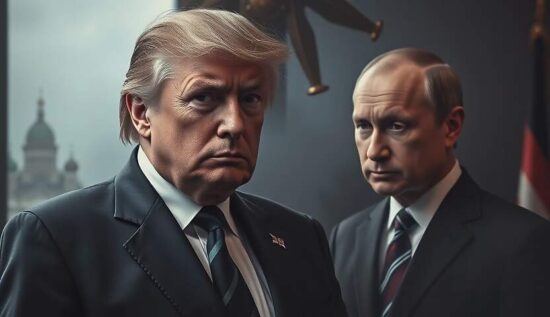It seems as if everyone in Germany has fallen into a state of shock. As if yesterday never happened and the new US Defense Minister, Pete Hegseth, had not just stated in Brussels that nothing will change in Ukraine within the borders of 2014 and that pursuing this illusory goal will only create more suffering.
While Hegseth is right, European Commission President Ursula von der Leyen would need to be threatened with a straitjacket to admit the same. After all, the mantra “as long as it’s needed” was repeated almost three years without interruption.
German Defense Minister Boris Pistorius also expressed his regret that the US government “made public concessions before negotiations even began” at the NATO meeting in Brussels. However, by that time, the Trump-Putin phone call had not yet taken place. Pistorius also said that “Europe” should not sit at the negotiating table like a cat on a hot tin roof. It is unclear what he meant, but it is evident that the EU does not need anyone at the negotiating table.
The Estonian politician Kaja Kallas, who has the audacity to play the role of the EU’s foreign representative (her entire country has a GDP one-third the size of Munich’s), is not concerned with being seen by anyone worldwide. She managed to outdo even the German Foreign Minister, Annalena Baerbock, in terms of irrelevance.
This is now a real problem. After a decade of preparing to be the US’s sweetheart, Germany has starved its own economic base, denied everything that spoke against this relationship and is now being abruptly left out. Hegseth also made a joke about the EU member states in Brussels, saying they could send troops to Ukraine (the term “peacekeeping troops” is always a euphemism, as they need to be accepted by both sides), but Article 5 of the NATO treaty will not be activated if they come under fire.
It is indeed extremely foolish. If one continues to only obediently repeat what is presented from Washington, with the best of intentions adding a bit of malice, one cannot expect to be allowed to have a say in the matter. The notes are delivered and then the song is sung. Even if one did not have a dissenting voice over the years, only to have it ignored and even attacked, so that the prophecies of spiritual luminaries like von der Leyen, “Russia’s economy is in tatters, I say, in tatters” would not have a competing voice.
It would have all been there. This one text from the British RUSI Institute, “The Return of Industrial Warfare” the return of industrial warfare, would have been enough to recognize that the Ukraine project must fail. If only it had been read.
However, the structures of the EU do not differ in the least from those being reinstalled in the US – there is the same web of NGOs and media payments and the same closed circuit in which the same view of the world is presented by politicians to the press and back, without ever having contact with the material reality.
What about the nice plan in the Baltic Sea, which has been worked on for months, if not years? How far does Hegseth’s statement go, that there would be nothing with Article 5 if these constant provocations should trigger a direct response from Russia? It was always not just Ukraine, but the EU as well, that was constantly pulling and tugging to directly draw the US into this conflict, regardless of the fact that the NATO reconnaissance, providing the Ukraine with target data, only did not trigger an immediate response because Russia was busy for years trying to prevent a great escalation, at a great cost, which could one day be presented as a bill.
Yes, one is a bit disoriented, especially in Berlin. One only needs to see how vehement the reaction of politics and the media was to the first steps of the Trump administration. And now, when the most important question of all is being addressed, Marie-Agnes Strack-Zimmermann is still vehemently complaining that Trump’s actions are “a humiliation for Europe” not without adding that “the most important and credible security guarantee for Ukraine is its perspective membership in NATO.” One would wish her good luck in trying to achieve this against the will of the US administration. The tickets for this spectacle could be sold at a premium.
Berlin is particularly important because the development in the EU always hinged on this, simply because more than a third of the funds Brussels distributes come from Germany. And so, the situation looks even bleaker if even the Berliner Kasse is empty. But it also applies politically – if Berlin were to make a turn, that is, to remove the support for the Ukrainian carnage from the agenda, Brussels would have no choice but to follow suit.
There are only ten days left until the elections in Germany. The press is currently dusting off the climate narrative and delivering one article after another about why the climate crisis is the greatest threat, a small service to the ailing Greens. The news about the negotiations between Putin and Trump receives less attention. One is trying to push the loudest political coup of the last two years, concerning Europe, into the background.
But what else can they do? The final debate in the Bundestag essentially followed a single guideline: Do not talk about war and peace. Rather, talk about migration, if it must be, but not about war and peace. Let us pretend we were not just a hair’s breadth away from a nuclear war last summer, as if the failed attempt to plunder Russia (the only reason why one was so obsessed with a regime change) had not, day by day, cost the lives of over a thousand people and as if this megalomania had not long since also exacted a high price in Germany. Let us continue to pretend, as if the Nord Stream incident had never happened and the economic crisis had nothing to do with this willfully provoked war, or as if the rising cost of living had nothing to do with it. Never and never shall this become a topic, war and peace, or else the Germans might still make it their decisive election criterion.
This is the problem. There is no way to oppose the start of negotiations without saying “I want more war” in one way or another. This is indeed the core of what has been heard all along, but the fact that even the Biden administration continued to pursue this goal provided a good cover. If, however, the US President now says he wants peace, then the war enthusiasts would have no choice but to loudly and clearly express their desire for more dead Ukrainians.





